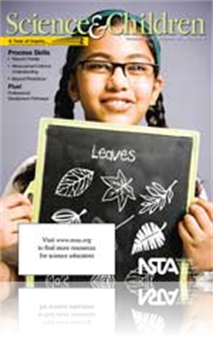All Science and Children resources
Journal Article
Guest Editorial: Inquiry, Process Skills, and Thinking in Science
Inquiry is central to science education today. But understanding its many nuances is still an issue according to research (Flick and Lederman 2004). And understanding is the first step to implementations. In this article, the author identifies six qu...
Journal Article
Measurement Informs Understanding
It is common practice for elementary classes to plant seeds so that students have the opportunity to observe them germinate and grow. Beyond introducing plant anatomy, this relatively simple activity has the potential to engage children as young plan...
Journal Article
The “Magic” String is a discrepant event that includes a canister with what appears to be the end of two strings protruding from opposite sides of it. Due to the way the strings are attached inside the canister, it appears as if the strings can m...
Journal Article
Editor’s Note: Inquiry—Process Skills
We take for granted that students have some abilities in questioning, observing, predicting, planning an investigation, collecting data, interpreting information, and communicating their ideas. But, this is more than likely not the case. We must be d...
Journal Article
Teaching Through Trade Books: Kitchen Chemistry
The kitchen is a wondrous place for children to make observations and explore the basics of chemistry. Seize the opportunity and help students build process skills while cooking or baking. Almost everything we eat and certainly everything that is com...
Journal Article
Science 101: How does loud noise affect hearing?
This is an appropriate question, especially in light of the recent news that the incidence of hearing loss in teens has been increased by a third. To understand how loud noise affects hearing, you need to know the basics of how your ear works. To und...
Journal Article
By thinking about the concept of density and taking into account the research on children’s ideas about this concept, the authors were able to unpack the typical sink or float activity and realize that it has students unscientifically making compar...
Journal Article
Science Shorts: Do You Hear What Horton Hears?
“I’ve never heard of a small speck of dust that is able to yell” says Horton of a sound he hears well (Geisel 1954). It is always valuable to connect science to student’s interests and their everyday world—so what better way to teach concep...
Journal Article
The Arnold Arboretum is a public “tree museum” that sits on more than 300 acres of parkland in Boston. Like many public parks, the arboretum uses a percentage of its funding to provide nature education for adults and schoolchildren, facilitated b...


